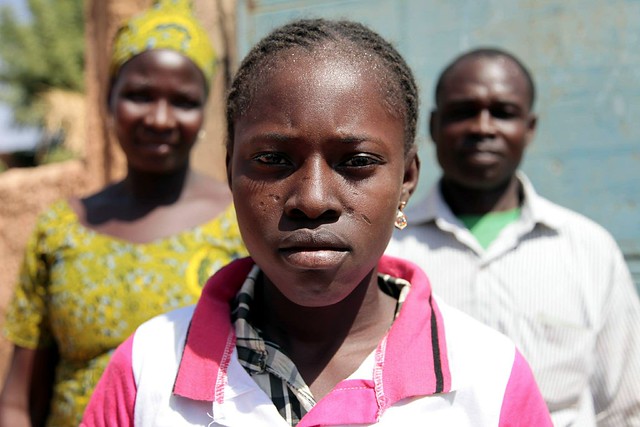A Question of Honor
Police response is out of sync with a sharp rise in so-called honor-based violence against women in the U.K. After Fatima, a 13-year-old girl in Burkina Fasso, and her parents took part in a peer-education program sponsored by a U.K. government agency, the family decided to forego the practice of female genital mutilation (FGM). (UK Department for International Development / Flickr)(CC BY 2.0)
After Fatima, a 13-year-old girl in Burkina Fasso, and her parents took part in a peer-education program sponsored by a U.K. government agency, the family decided to forego the practice of female genital mutilation (FGM). (UK Department for International Development / Flickr)(CC BY 2.0)
LONDON — Diana Kader was in her early 20s and living in the U.K. in 2005 when her family took her on a holiday to Yemen, their country of origin. She met relatives, visited tourist sites and stayed in the village where her parents were born. Two of her sisters fell in love and married Yemeni men. A wealthy suitor approached Kader’s father, asking for her hand in marriage. Kader, who wanted to continue her studies in the U.K., refused. Her family supported her decision. The suitor persisted and even threatened the family. Eventually, however, he seemed to accept her decision.
In May 2006, Kader set off on a road trip around Yemen, alone. On the highway, she was run off the road by a petrol tanker belonging to her suitor’s family. Her car flipped; she was thrown out. As she lay injured, her suitor, who had been driving the tanker, approached her and phoned her father. He said he would leave her to die by the side of the road “like a dog,” although he finally relented and took her to a hospital. Her arm and leg were broken, and her pelvis was shattered in four places.
Her suitor claimed that the crash was an accident. The statement released by police and forensic officers regarding the incident clearly contradicts his claim. This translation has been verified by a neutral third party: “Police and forensic officers … found from the tread marks that the petrol tanker … had been driving on the wrong side of the road, heading in Diana Kader’s direction and forcing her off the road. Evidence also suggests that the petrol tanker had done a U turn in the road and chased Diana’s vehicle. … Our investigation shows that Diana Kader had been deliberately forced off the road, then hit. … Our investigation corroborates Diana Kader’s statement [that she was intentionally struck with the goal of killing her].”
Despite these findings, no action was taken against her suitor.
At the hospital, Kader was given poor medical care and nearly died, deprived of food and water—treatment her family believes was linked to her suitor’s powerful local position. Her doctor in the U.K. verified in a letter that the doctors in Yemen had operated on her incorrectly three times and had not treated her broken bones. The Yemeni doctors had also made an eight-inch incision to her abdominal area and left it open. British medical team members who treated her upon her return home said they had never seen anything similar. They also found surgical cuts to her intestines, suggesting deliberate harm. Kader underwent two years of corrective surgery. Her U.K. doctor was of the opinion that the Yemeni medical team had caused her deliberate damage.
Kader’s father had managed to have her airlifted home, where she spent nearly four years in a British hospital. Thirteen years later, she still struggles with permanent injuries and pain, but despite these challenges, she is now a forensic scientist.
Kader is a survivor of so-called honor-based violence (HBV). I co-wrote “Hear My Cry” with her, published by Hachette Poland in 2015.
HBV is used predominantly to control the behavior of women and girls to protect cultural and religious beliefs, values and social norms in the name of “honor.” People who commit HBV are usually family members or friends. The “honor code” is set at the discretion of male relatives or the wider cultural community in which a family lives. Women who do not abide by the “rules” are punished for bringing shame on the family.
HBV can be committed against people who become involved romantically with someone from a different culture or religion, want to escape an arranged or forced marriage, or take part in activities not considered traditional—these are just a few examples. Women and girls of marriageable age are the most common victims of HBV, but it can also affect men and boys. People with disabilities are also often targeted for forced marriage. Crimes committed in the name of honor include assaults, disfigurement, sexual assault and rape, forced marriage, female genital mutilation, kidnapping and false imprisonment.
The number of HBV cases reported to the police in the U.K. increased by 53% between 2014 and 2017. Significantly, 2014 was the year forced marriage was criminalized in England and Wales. But despite the leap in reporting since 2014, the number of cases referred to the Crown Prosecution Service (CPS), an organization that prosecutes criminal cases investigated by the police, is the lowest it has been for five years. Of the 5,105 cases of HBV reported in 2016, police referred only 256 cases to CPS in 2016-17.
Experts and organizations working with women in the U.K. are concerned at both the sharp reporting rise and the low level of prosecution for the crime. Another concern involves immigrant women who are threatened with deportation by male abusers if they complain to police. Women from migrant backgrounds are disproportionately at risk from all forms of sex-based violence, including HBV.
The U.K. has not yet ratified the Istanbul Convention on Ending Violence Against Women, which states that all women should be protected from violence, regardless of their immigration status. Twenty-two European countries have ratified; the U.K. has confirmed its intention to ratify, but before it can, it needs to complete changes to British law. With Brexit soaking up parliamentary time, this has, so far, failed to happen. Ratifying would give women like Kader more protection across the whole of Europe, with more chances of prosecuting perpetrators, who can use lax legislation to escape across borders.
In Kader’s case, the violence she suffered in Yemen was not the end of the story. Since the family returned to their home in Eccles, in greater Manchester, they have experienced around 20 attacks, thought to have been committed by some community members. The attacks were recorded by the police, and included death threats, arson, property destruction, harassment, assault and burglary. When I asked local police why there had been only one prosecution, a senior officer asked me, “How do you prosecute an entire community?”
Such community harassment is by no means unusual, says Diana Nammi, director of the Iranian and Kurdish Women’s Rights Organisation (IKWRO), a charity that campaigns within Middle Eastern communities to combat all forms of HBV. “Contrary to common belief, often perpetrators are not only or even always family members, but also members of the community. There will often be influence from the tribal leaders, in this case in Yemen. Some members in the U.K. will themselves strongly believe that the ‘honor’ code must be upheld; sometimes their outlook might actually be more extreme. This is because some minority communities hold onto old values as a way of trying to protect their identity.”
She explains why HBV is so difficult to uproot. Reflecting on her own life and her work with thousands of women and girls, both when she was a peshmerga (Kurdish freedom fighter) and later, when she came to the U.K. and set up IKWRO in 2002, she says, “I came to know that through the honor code, communities control every aspect of a woman’s life, from the moment she is born. Girls and women are conditioned to comply with rules of ‘honor’ within the patriarchal system.”
She draws attention to the poor investigation of Kader’s case by local police. “A particularly concerning point from Diana’s case is that the U.K. police seemed to have had such a poor understanding of the parameters of ‘honor’-based violence. They assumed that because Diana’s close family were supportive of her, and themselves were subject to attacks, that this was not honor-based violence. They treated each of the crimes separately and did not join up the dots. Honor-based violence is organized, and often a collective crime. It is essential that the police see it as such so they can gather and assess all intelligence collectively, so that they can protect those at risk. Unfortunately, this is not the first evidence that IKWRO has of systematic failure in policing honor-based violence. Our 2014 research found that one in five police forces failed to properly record honor-based violence, thereby missing crucial intelligence and leaving people at risk.”
Other forms of HBV in the U.K., such as female genital mutilation (FGM), are also hard to tackle. Naana Otoo-Oyortey, chief executive of Forward, a group that works with African communities in the U.K., Europe and Africa, warns that the U.K. needs to understand how communities work and how to engage them to create sustained change. “Women can be put under pressure by parents here or relatives back home,” Otoo-Oyortey says. “You definitely have to address the element of community and family pressure. This is unlike issues of domestic violence, where it is [an] individual facing that form of violence or sexual abuse. FGM has more community approval, [and] more community sanctions as well—if you haven’t been through [FGM] you technically can’t get married.”
Forward made a strategic decision to work in African countries where female genital mutilation is routinely practiced, talking to elders responsible for encouraging customary practices that affect the diaspora as much as girls and women living in certain communities in those countries. Otoo-Oyortey explains: “In Tanzania, FGM happens in different areas in different times for different clans. It’s well organized. The elders give permission to the cutters, identify them, and then determine how much will be paid for each girl who goes through it. The cutting season starts in December, when primary schools close. Everybody knows it’s against the law, and many turn a blind eye.” More recently, there has been some police enforcement, she says, but more importantly, there has been a cultural shift. “That’s why we do the work. You can’t do it as a three- or five-year project; it’s a ten-year initiative to work with the community to embed the change.”
If girls and women don’t have to face pressure from their countries of origin, they are less likely to be subjected to HBV in the U.K. Forward ran a groundbreaking project in Bristol in 2006, training local refugee women to do participatory research about female genital mutilation in their communities. “We trained them to speak to their networks, and they all came back saying there were huge challenges,” Otoo-Oyortey says. “They were shocked that the practice was so entrenched. Nobody was talking about it, as they thought it was a personal thing.” The Bristol project has now spread to other cities.
But new challenges keep emerging. “In the last 10 years, I have heard new terminologies like sunnah around FGM,” Otoo-Oyortey says. “This suggests it’s become a religious obligation for Muslim communities, and that means some communities will do everything to do FGM. That is a worrying trend. Where there is demand there will be supply.” She warns, too, that the linking of female genital mutilation to terrorism by the U.K. government is unhelpful, as is the wider vocabulary used to describe such HBV practices. “I worry about the language used, such as ‘barbaric’ and ‘medieval.’ It ‘others’ our communities.”
There has been progress, even amid outstanding challenges, such as the fact that child marriage between the age of 16 and 18 remains legal in the U.K., something that a consortium of organizations is campaigning to change.
“U.K. responses to honor-based violence/abuse (HBV/A) and the related offences of forced marriage, and female genital mutilation are changing rapidly,” explains Aisha Gill, a professor of criminology at the University of Roehampton who has studied HBV. “Over the past decade, HBV/A has become a growing policy challenge in the U.K. Many of the studies I have conducted focused on aspects of victims’ experiences, the emergence of new professional practice in response to HBV/A, and the key issues of racism, discrimination and cultural misunderstanding in this field.”
The good news is that more girls and women are speaking out, rather than being shamed into silence. As Kader told me, looking back on her ordeal, “I overcame it. I want to tell my story so that others learn from it.”
Your support matters…Independent journalism is under threat and overshadowed by heavily funded mainstream media.
You can help level the playing field. Become a member.
Your tax-deductible contribution keeps us digging beneath the headlines to give you thought-provoking, investigative reporting and analysis that unearths what's really happening- without compromise.
Give today to support our courageous, independent journalists.








You need to be a supporter to comment.
There are currently no responses to this article.
Be the first to respond.